- Empress Catherine II of Russia called Catherine The Great dies.
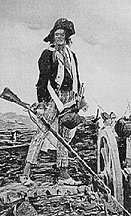 The 1790s were turbulent times in Europe. France had been an aggressive neighbor and other European powers were willing enough to see her weakened. The undisciplined French revolutionary troops invaded Belgium but refused to fight against the highly trained Austrians.
The 1790s were turbulent times in Europe. France had been an aggressive neighbor and other European powers were willing enough to see her weakened. The undisciplined French revolutionary troops invaded Belgium but refused to fight against the highly trained Austrians.
In 1792 Duke of Brunswick's 100,000 Prussians, Austrians, French Royalists and some Hessians gathered for a march on Paris. The desertion was high and the weather was awful. Duke of Brunswick detached many of his troops to guard his line of communication. All what was left were 35,000 men. They crossed the French border and met 33,000 French under Kellermann and Dumoriez at Valmy. The French won, thanks to their artillery.
The French invaded Sardinian provinces of Savoy and Nice, captured Mainz (Mayence) and raided Frankfurt. In autumn they invaded Flanders, defeated the Austrians and took the whole country,
incl. the wealthy city-port of Antwerp. Great Britain was enraged ("a pistol pointed at the heart of England"). Austria, after the loss of Flanders, was absolutely furious. The Sardinians were frightened. Austria, Great Britain, Sardinia, Prussia, Spain and Holland formed the First Coalition against France.
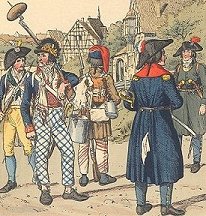 In 1793 the French under Dumoriez invaded Holland but were defeated by the Austrians at Neerwinden. The French commander attempted a counter-revolution, failed and fled to the Austrians.
In 1793 the French under Dumoriez invaded Holland but were defeated by the Austrians at Neerwinden. The French commander attempted a counter-revolution, failed and fled to the Austrians.
The morale of French armies collapsed and they withdrew behind their own borders.
The British supported with money and troops the Royalist revolts in Vendee and Toulon, while the Austrians and Prussians besieged French fortresses on the northern borders.
France was in crisis and Jacobin fanatics, incl. Robespierre, took power. Many unsuccessful generals went to the guillotine, the troops were reorganized and thousands of highly enthusiastic volunteers filled its ranks.
In 1796, France, having won its own freedom, would now fight for the liberation of all Europe.
The only problem was her armies. The troops were unpaid, hungry and lacked clothes, they were almost mutinous. The Austrian Supreme War Council gave up hope of recovering Belgium but considered an offensive to clear the French from Italy.
Great Britain pressed Austria for more decisive action and offered money. Austria, hoping for substantial financial support, sent another strong army to Germany. Approx. 95,000 white-coats were under the command of Archduke Charles.
 Map: France's military situation in 1796
Map: France's military situation in 1796
 General Jourdan's "Army of Sambre-Meuse" (75,000 men)
General Jourdan's "Army of Sambre-Meuse" (75,000 men)
- against 95,000 Austrians under Archduke Charles. It was the best and the biggest of allies' armies in that time. Soon it will enjoy series of victories against the French army. Archduke Charles will win his fame and Wellington will declare him as the best of Allied generals.
 General Moreau's "Army of Rhine-Moselle" (80,000 men)
General Moreau's "Army of Rhine-Moselle" (80,000 men)
- against 85,000 Austrians under Wurmser
 General Bonaparte's "Army of Italy" (60,000 men)
General Bonaparte's "Army of Italy" (60,000 men)
- against 55,000 Austrians and Italians (Sardinians)
 General Kellermann's "Army of the Alps" (18,000 men)
General Kellermann's "Army of the Alps" (18,000 men)
- guarding the Alps passages
 General Hoche's "Army of the West" (15,000 men)
General Hoche's "Army of the West" (15,000 men)
- for invasion of Ireland.
In February 1797 General Tate [an American officer !] made a raid with 4 ships and 1,230 French troops against Fishguard in Great Britain. The French morale was low due to very cold winter weather and hunger. The soldiers were second rate troops, they were recruited from convicts, deserters etc. For several days they looted the English villages and searched for food. There were also several skirmishes with the British Yeomanry, militia, Royal Navy sailors, and some artillery before Tate and the few starwing French surrendered. For more info click here. (ext.link)
 In this turbulent time officer Bonaparte appeared on the scene.
In this turbulent time officer Bonaparte appeared on the scene.
Napoleon was born in 1769. In the age of 10 he was admitted to the Military Academy at
Brienne.
When Bonaparte was 15 years old he moved to Paris for advanced training.
In 1785 Bonaparte passed the artillery examination and was commissioned a second lieutenat
in artillery.
The young Bonaparte was described during military academy's evaluation as
"well versed in mathematics and geography; was taciturn, loved solitude, was obstinate,
proud, and exceptionally inclined to egotism; spoke little, was energetic in his answers,
ready and severe in his refutations."
In the age of 22 Bonaparte became first lieutenant and the next year he got himself elected
to an auxiliary post of a Corsican volunteer infantry. His name was removed from the
French Army rolls for absence without leave. Bonaparte returned and went straight to
Paris where he vigorously protested. He obtained not only his reinstatement but advanced to
captain !
Bonaparte's Corsican battalion participated in unsuccessful expedition against Sardinia. He then decided to seek his fortunes in the French Army and joined his artillery regiment,
which was engaged in the siege of Tulon.
 In 1790s "political commissars" accompanied the French troops and wielded supreme power.
One of them was Saliceti of Corsica. When the commander of artillery at Toulon was wounded,
Saliceti secured the post for young Napoleon Bonaparte.
In 1790s "political commissars" accompanied the French troops and wielded supreme power.
One of them was Saliceti of Corsica. When the commander of artillery at Toulon was wounded,
Saliceti secured the post for young Napoleon Bonaparte.
In 1793 at French Royalists invitation, British and Spanish forces occupied Toulon, the main French naval base on the Mediterranean. Bonaparte first made his name here as a young officer of artillery, by spotting an ideal place for his guns to be set up in such a way that they dominated the city's harbour. Once this was done (by means of a sharp assault on an enemy position), the British Navy ships under Admiral Hood and the Spaniards under Juan de Langara were compelled to withdraw, and the resistance crumbled.
Robespierre was enthusiastic and wrote to Paris about this ambitious officer of
artillery and his achievement. Bonaparte was promoted to general of brigade.
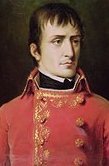 In 1795 Bonaparte was in Paris when a counter-revolutionary uprising broke out in the city. Barras selected him to restore order. This he did quickly, he smashed the rebellion in a matter of hours.
In 1795 Bonaparte was in Paris when a counter-revolutionary uprising broke out in the city. Barras selected him to restore order. This he did quickly, he smashed the rebellion in a matter of hours.
On October 5, 1795, when he fired the famous "whiff of grapeshot" a single artillery salvo in that suppressed the uprising. Bonaparte was promoted to general of division.
Although soon Bonaparte was assigned to a very high post, the commander of the Army of the
Interior, he continued writing about the Army of Italy. He criticized that army's operations,
slowness, lack of success and poor tactics. Scherer, the commander of Army of Italy
was infuriated by the flow of plans, which he considered to be beyond the capabilities of his army. Scherer resigned and was replaced with Bonaparte.
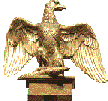
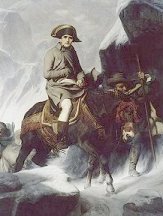 "Bonaparte goes up in the mountains.
"Bonaparte goes up in the mountains.
 The 1790s were turbulent times in Europe. France had been an aggressive neighbor and other European powers were willing enough to see her weakened. The undisciplined French revolutionary troops invaded Belgium but refused to fight against the highly trained Austrians.
The 1790s were turbulent times in Europe. France had been an aggressive neighbor and other European powers were willing enough to see her weakened. The undisciplined French revolutionary troops invaded Belgium but refused to fight against the highly trained Austrians.
 In 1793 the French under Dumoriez invaded Holland but were defeated by the Austrians at Neerwinden. The French commander attempted a counter-revolution, failed and fled to the Austrians.
In 1793 the French under Dumoriez invaded Holland but were defeated by the Austrians at Neerwinden. The French commander attempted a counter-revolution, failed and fled to the Austrians.
 Map: France's military situation in 1796
Map: France's military situation in 1796 In this turbulent time officer Bonaparte appeared on the scene.
In this turbulent time officer Bonaparte appeared on the scene. In 1790s "political commissars" accompanied the French troops and wielded supreme power.
One of them was Saliceti of Corsica. When the commander of artillery at Toulon was wounded,
Saliceti secured the post for young Napoleon Bonaparte.
In 1790s "political commissars" accompanied the French troops and wielded supreme power.
One of them was Saliceti of Corsica. When the commander of artillery at Toulon was wounded,
Saliceti secured the post for young Napoleon Bonaparte.
 In 1795 Bonaparte was in Paris when a counter-revolutionary uprising broke out in the city. Barras selected him to restore order. This he did quickly, he smashed the rebellion in a matter of hours.
In 1795 Bonaparte was in Paris when a counter-revolutionary uprising broke out in the city. Barras selected him to restore order. This he did quickly, he smashed the rebellion in a matter of hours.
 Bonaparte took the command of the Army of Italy and moved the headquarters to Albenga.
The motives for his appointment were political. By placing him in command of the Army of Italy, Bonaparte was being relegated to obscurity.
Bonaparte took the command of the Army of Italy and moved the headquarters to Albenga.
The motives for his appointment were political. By placing him in command of the Army of Italy, Bonaparte was being relegated to obscurity.
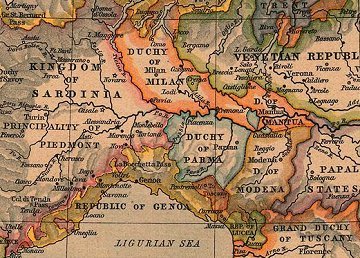 The Allies commanders in Italy, Colli and Beaulieu, had noted Bonaparte's arrival. Colli's chief-of-staff had reported: "Bonaparte is not known for any striking feat,
but he is understood to be a profound theorist and a man of talent."
The Allies commanders in Italy, Colli and Beaulieu, had noted Bonaparte's arrival. Colli's chief-of-staff had reported: "Bonaparte is not known for any striking feat,
but he is understood to be a profound theorist and a man of talent."
 Allies led by Beaulieu began their offensive by attacking Bonaparte's advance guard commanded by Massena. General Beaulieu (1725-1819) was a seasoned general.
He had held his own in Belgium against Dumouriez in 1792, and Jourdan in 1794. Beaulieu was chief of staff to the army of Duke of York. In 1794 he received the rank of Feldzeugmeister.
Allies led by Beaulieu began their offensive by attacking Bonaparte's advance guard commanded by Massena. General Beaulieu (1725-1819) was a seasoned general.
He had held his own in Belgium against Dumouriez in 1792, and Jourdan in 1794. Beaulieu was chief of staff to the army of Duke of York. In 1794 he received the rank of Feldzeugmeister.
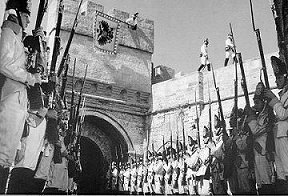 Beaulieu happy with his victory at Voltri, leisurely began establishing a new cordon from Voltri to Monte Negino. On 12th April 1796 Bonaparte crushed General Eugène-Guillaume-Alexis Mercy d'Argenteau's 6,000 white-coats at Montenotte. The Austrians had 2,500 casualties.
Meanwhile GVukassovich's 3,500 white-coats slowly marched toward Dego. The weather was horrible, cold and rainy. Austrian light cavalrymen came with sensational news that Dego is full of sleeping French veterans. Vukassovich's infantry "promptly hit Dego like a rockslide."
Beaulieu happy with his victory at Voltri, leisurely began establishing a new cordon from Voltri to Monte Negino. On 12th April 1796 Bonaparte crushed General Eugène-Guillaume-Alexis Mercy d'Argenteau's 6,000 white-coats at Montenotte. The Austrians had 2,500 casualties.
Meanwhile GVukassovich's 3,500 white-coats slowly marched toward Dego. The weather was horrible, cold and rainy. Austrian light cavalrymen came with sensational news that Dego is full of sleeping French veterans. Vukassovich's infantry "promptly hit Dego like a rockslide."
 Vukassovich stalled Bonaparte's advance at Dego, but Beaulieu and Argentau took no advantage of this situation. Timid Argentau turned around and retired.
Beaulieu abandoned Voltri and was focused on collecting his scattered troops and restoring the cordon screen. Later Vukassovich while shut up in Mantua, did great service during the siege of that place.
Vukassovich stalled Bonaparte's advance at Dego, but Beaulieu and Argentau took no advantage of this situation. Timid Argentau turned around and retired.
Beaulieu abandoned Voltri and was focused on collecting his scattered troops and restoring the cordon screen. Later Vukassovich while shut up in Mantua, did great service during the siege of that place.
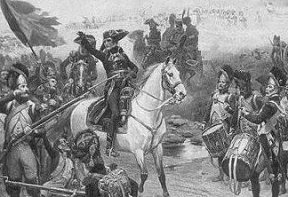 After signing the armistice, Bonaparte sent his troops after the retreating Austrians.
Beaulieu took position behind Po River and had destroyed the bridges along his front.
Bonaparte had no pontoon bridge but he sent 100 picked light cavalrymen to secure boats.
After signing the armistice, Bonaparte sent his troops after the retreating Austrians.
Beaulieu took position behind Po River and had destroyed the bridges along his front.
Bonaparte had no pontoon bridge but he sent 100 picked light cavalrymen to secure boats.
 Chandler writes: "Bonaparte after crossing the river Po near Piacenza, was making a determined effort to trap General Beaulieu west of the Adda. In fact the French arrived too late to prevent the Austrian retreat, and at Lodi only fought Beaulieu's rear guard." (Chandler - "Dictionary of the Napoleonic Wars" p 252)
Chandler writes: "Bonaparte after crossing the river Po near Piacenza, was making a determined effort to trap General Beaulieu west of the Adda. In fact the French arrived too late to prevent the Austrian retreat, and at Lodi only fought Beaulieu's rear guard." (Chandler - "Dictionary of the Napoleonic Wars" p 252)
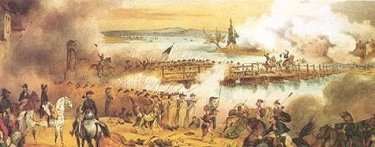 Bonaparte formed 3,000 infantry in one long column, six abreast. Meanwhile the French guns doubled its ratio of fire and the Austrian battery was forced to retire.
Now, out of the smoke, straight across the very long bridge, roared the 3,000 Frenchmen.
They got to the center of the bridge before the white-coats opened musket fire and smashed the front ranks into a tangle of killed and wounded.
Bonaparte formed 3,000 infantry in one long column, six abreast. Meanwhile the French guns doubled its ratio of fire and the Austrian battery was forced to retire.
Now, out of the smoke, straight across the very long bridge, roared the 3,000 Frenchmen.
They got to the center of the bridge before the white-coats opened musket fire and smashed the front ranks into a tangle of killed and wounded.
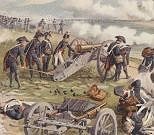 The news about victory at Lodi created a tremendous sensation in Paris. Bonaparte would say that "it was Lodi that made him certain he could be a man of high destiny."
Napoleon's troops gave him the affectionate nickname Le Petit Corporal "The Little Corporal" (he sighted a cannon, usually it was job for an corporal).
The news about victory at Lodi created a tremendous sensation in Paris. Bonaparte would say that "it was Lodi that made him certain he could be a man of high destiny."
Napoleon's troops gave him the affectionate nickname Le Petit Corporal "The Little Corporal" (he sighted a cannon, usually it was job for an corporal).
 Bonaparte successfully divided Allies. Colli was surrounded in the west, Beaulieu was pursued in the east. The Allies crossed Po River and marched toward Mincio River and the powerful Mantova (Mantua) fortress. It was the key to control of northern Italy and was bitterly disputed by the French and Austrians.
Bonaparte successfully divided Allies. Colli was surrounded in the west, Beaulieu was pursued in the east. The Allies crossed Po River and marched toward Mincio River and the powerful Mantova (Mantua) fortress. It was the key to control of northern Italy and was bitterly disputed by the French and Austrians.
 Bonaparte made a triumphant entry into the wealthy and important city Milan. He organized the occupied territory to support and feed his troops. Bonaparte's soldiers were finally clothed, well fed and well paid.
Bonaparte made a triumphant entry into the wealthy and important city Milan. He organized the occupied territory to support and feed his troops. Bonaparte's soldiers were finally clothed, well fed and well paid.
 By maintenance of the initiative, rapidity of maneuver and concentration of superior forces at the right moment and the right place, he defeated every army thrown at him.
According to British historian Liddell Hart "For a century the first (Napoleon's) campaign in Italy has been described - I am almost tempted to say, sung - as a triumphant epic of offensive
movements, according to which Bonaparte conquered Italy so easily because he followed
up attack with attack, with a boldness that was equal to his good luck."
By maintenance of the initiative, rapidity of maneuver and concentration of superior forces at the right moment and the right place, he defeated every army thrown at him.
According to British historian Liddell Hart "For a century the first (Napoleon's) campaign in Italy has been described - I am almost tempted to say, sung - as a triumphant epic of offensive
movements, according to which Bonaparte conquered Italy so easily because he followed
up attack with attack, with a boldness that was equal to his good luck."
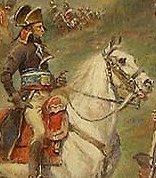 At the end of the campaign, Bonaparte's first year of independent command (!), he stood less than 100 miles from Vienna, the Austrian capital. He forced the Austrians to a truce and then a peace, captured 160,000 prisoners of war, 170 flags and more than 2,000 guns, and extorted untold millions of francs in contributions.
At the end of the campaign, Bonaparte's first year of independent command (!), he stood less than 100 miles from Vienna, the Austrian capital. He forced the Austrians to a truce and then a peace, captured 160,000 prisoners of war, 170 flags and more than 2,000 guns, and extorted untold millions of francs in contributions.
